Law 1 Report: Ethics and Legal Profession with Bar Standards Code 2020
VerifiedAdded on 2022/12/30
|10
|3470
|2
Report
AI Summary
This report provides an overview of ethics within the legal profession, with a specific focus on the UK legal system and the roles of solicitors and barristers. It examines the importance of ethical considerations, including independence, honesty, and integrity, and their influence on legal practice. The report explores the SRA code of conduct for solicitors and the 2020 Bar Standards Board of Code of Conduct, highlighting the core duties of barristers, and potential ethical dilemmas. It also references Mark Humphries' work on ethical principles, emphasizing the duties of advocates towards their clients, the court, and the state. The conclusion underscores the differences between the legal roles of solicitors and barristers, and the regulatory oversight provided by the SRA. This report offers a detailed analysis of ethical guidelines and their practical implications for legal professionals.
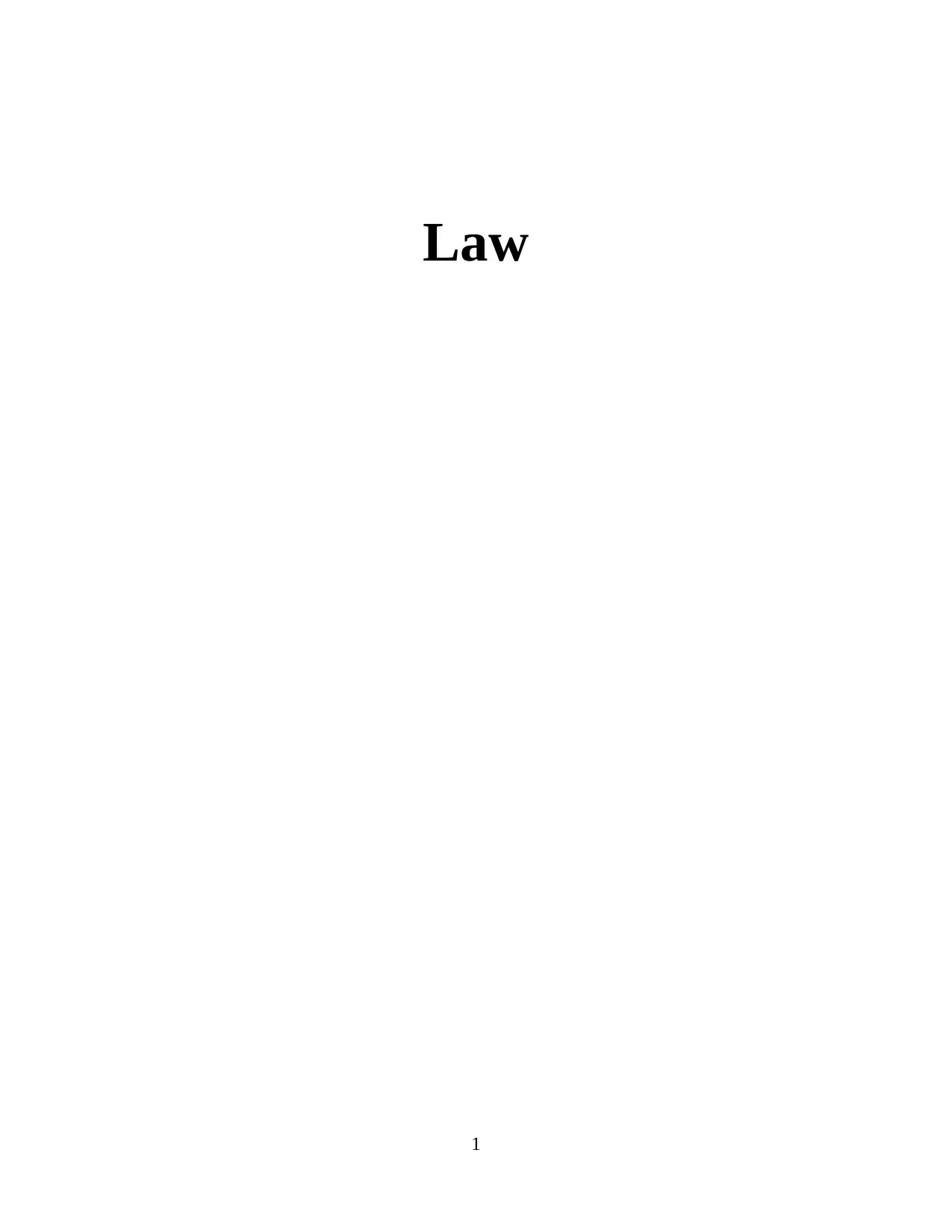
Law
1
1
Paraphrase This Document
Need a fresh take? Get an instant paraphrase of this document with our AI Paraphraser
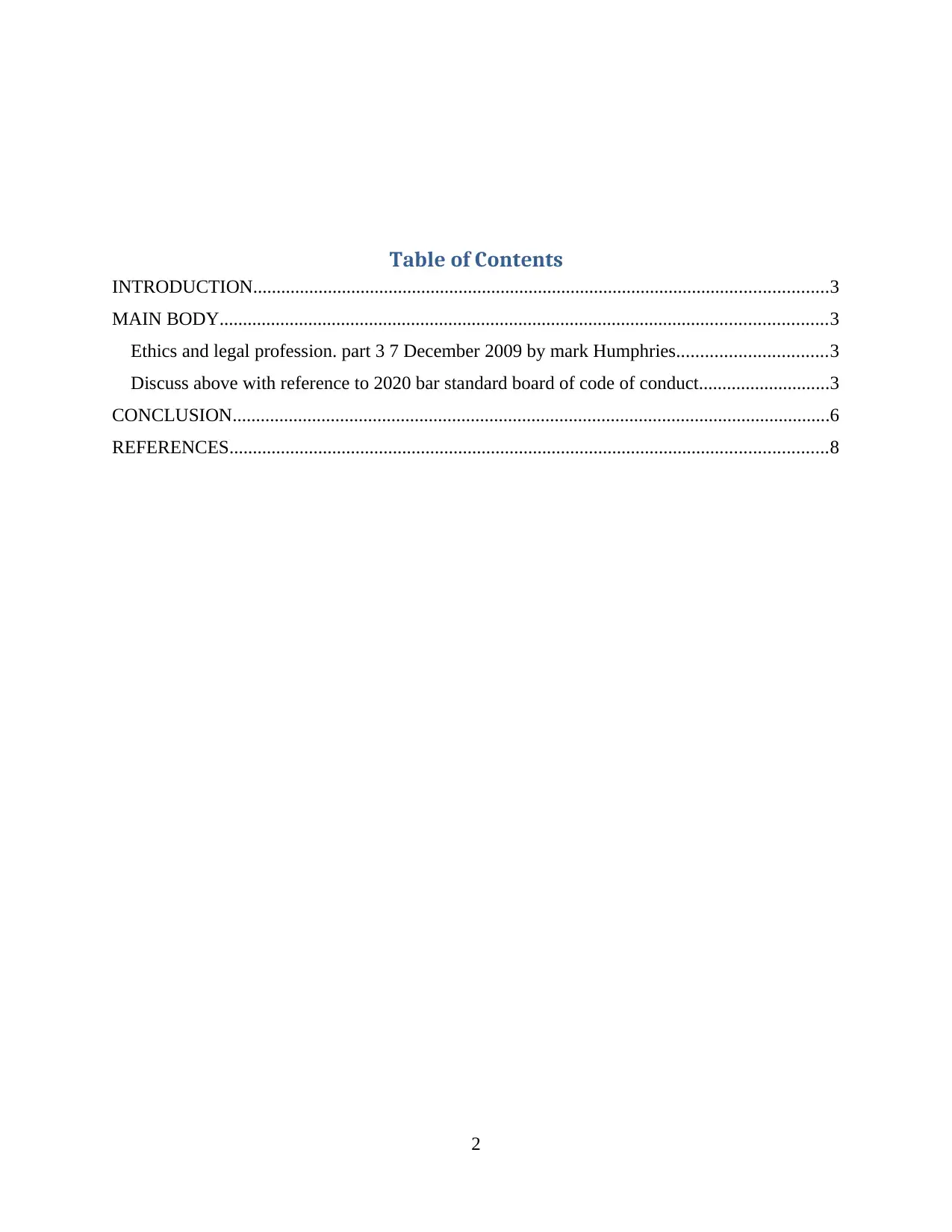
Table of Contents
INTRODUCTION...........................................................................................................................3
MAIN BODY..................................................................................................................................3
Ethics and legal profession. part 3 7 December 2009 by mark Humphries................................3
Discuss above with reference to 2020 bar standard board of code of conduct............................3
CONCLUSION................................................................................................................................6
REFERENCES................................................................................................................................8
2
INTRODUCTION...........................................................................................................................3
MAIN BODY..................................................................................................................................3
Ethics and legal profession. part 3 7 December 2009 by mark Humphries................................3
Discuss above with reference to 2020 bar standard board of code of conduct............................3
CONCLUSION................................................................................................................................6
REFERENCES................................................................................................................................8
2
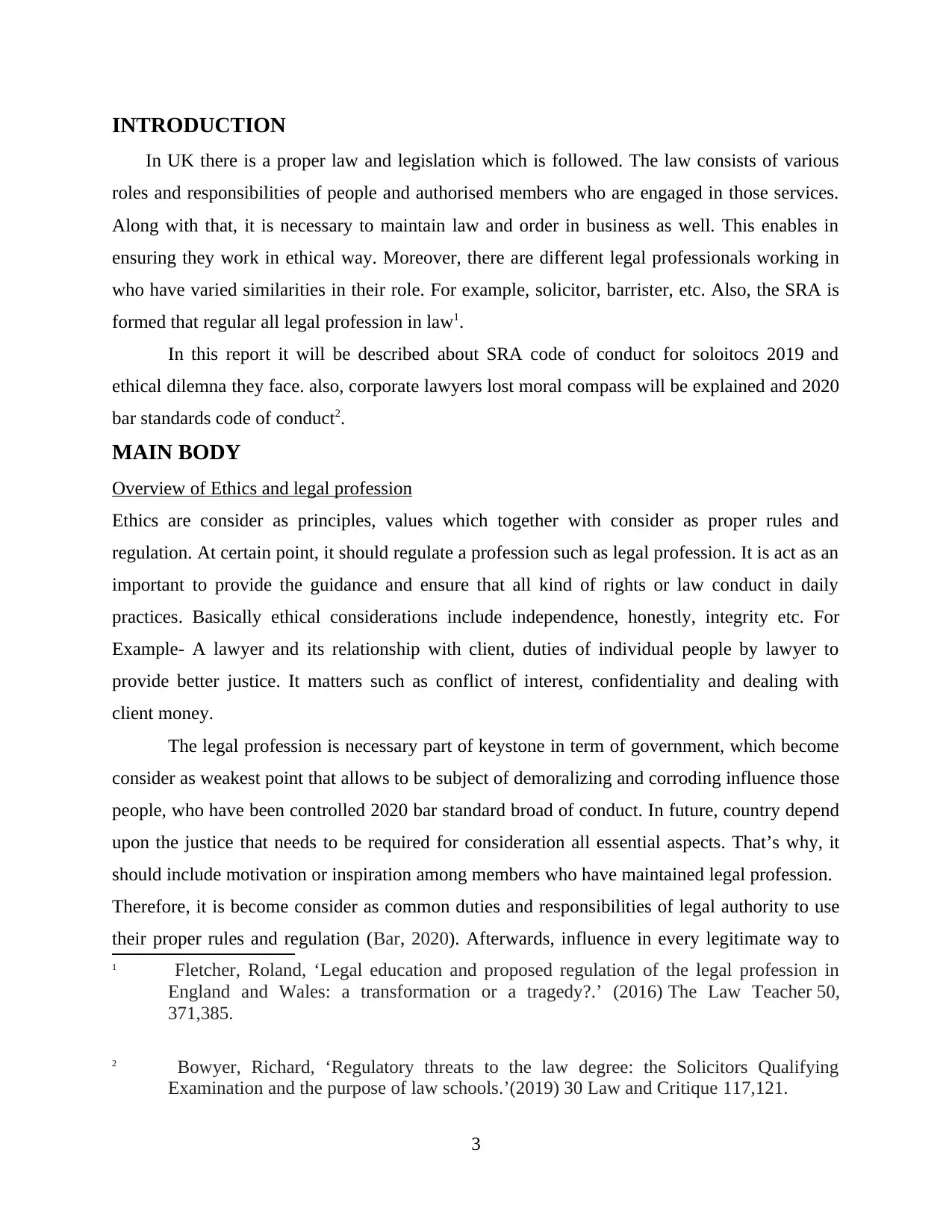
INTRODUCTION
In UK there is a proper law and legislation which is followed. The law consists of various
roles and responsibilities of people and authorised members who are engaged in those services.
Along with that, it is necessary to maintain law and order in business as well. This enables in
ensuring they work in ethical way. Moreover, there are different legal professionals working in
who have varied similarities in their role. For example, solicitor, barrister, etc. Also, the SRA is
formed that regular all legal profession in law1.
In this report it will be described about SRA code of conduct for soloitocs 2019 and
ethical dilemna they face. also, corporate lawyers lost moral compass will be explained and 2020
bar standards code of conduct2.
MAIN BODY
Overview of Ethics and legal profession
Ethics are consider as principles, values which together with consider as proper rules and
regulation. At certain point, it should regulate a profession such as legal profession. It is act as an
important to provide the guidance and ensure that all kind of rights or law conduct in daily
practices. Basically ethical considerations include independence, honestly, integrity etc. For
Example- A lawyer and its relationship with client, duties of individual people by lawyer to
provide better justice. It matters such as conflict of interest, confidentiality and dealing with
client money.
The legal profession is necessary part of keystone in term of government, which become
consider as weakest point that allows to be subject of demoralizing and corroding influence those
people, who have been controlled 2020 bar standard broad of conduct. In future, country depend
upon the justice that needs to be required for consideration all essential aspects. That’s why, it
should include motivation or inspiration among members who have maintained legal profession.
Therefore, it is become consider as common duties and responsibilities of legal authority to use
their proper rules and regulation (Bar, 2020). Afterwards, influence in every legitimate way to
1 Fletcher, Roland, ‘Legal education and proposed regulation of the legal profession in
England and Wales: a transformation or a tragedy?.’ (2016) The Law Teacher 50,
371,385.
2 Bowyer, Richard, ‘Regulatory threats to the law degree: the Solicitors Qualifying
Examination and the purpose of law schools.’(2019) 30 Law and Critique 117,121.
3
In UK there is a proper law and legislation which is followed. The law consists of various
roles and responsibilities of people and authorised members who are engaged in those services.
Along with that, it is necessary to maintain law and order in business as well. This enables in
ensuring they work in ethical way. Moreover, there are different legal professionals working in
who have varied similarities in their role. For example, solicitor, barrister, etc. Also, the SRA is
formed that regular all legal profession in law1.
In this report it will be described about SRA code of conduct for soloitocs 2019 and
ethical dilemna they face. also, corporate lawyers lost moral compass will be explained and 2020
bar standards code of conduct2.
MAIN BODY
Overview of Ethics and legal profession
Ethics are consider as principles, values which together with consider as proper rules and
regulation. At certain point, it should regulate a profession such as legal profession. It is act as an
important to provide the guidance and ensure that all kind of rights or law conduct in daily
practices. Basically ethical considerations include independence, honestly, integrity etc. For
Example- A lawyer and its relationship with client, duties of individual people by lawyer to
provide better justice. It matters such as conflict of interest, confidentiality and dealing with
client money.
The legal profession is necessary part of keystone in term of government, which become
consider as weakest point that allows to be subject of demoralizing and corroding influence those
people, who have been controlled 2020 bar standard broad of conduct. In future, country depend
upon the justice that needs to be required for consideration all essential aspects. That’s why, it
should include motivation or inspiration among members who have maintained legal profession.
Therefore, it is become consider as common duties and responsibilities of legal authority to use
their proper rules and regulation (Bar, 2020). Afterwards, influence in every legitimate way to
1 Fletcher, Roland, ‘Legal education and proposed regulation of the legal profession in
England and Wales: a transformation or a tragedy?.’ (2016) The Law Teacher 50,
371,385.
2 Bowyer, Richard, ‘Regulatory threats to the law degree: the Solicitors Qualifying
Examination and the purpose of law schools.’(2019) 30 Law and Critique 117,121.
3
⊘ This is a preview!⊘
Do you want full access?
Subscribe today to unlock all pages.

Trusted by 1+ million students worldwide
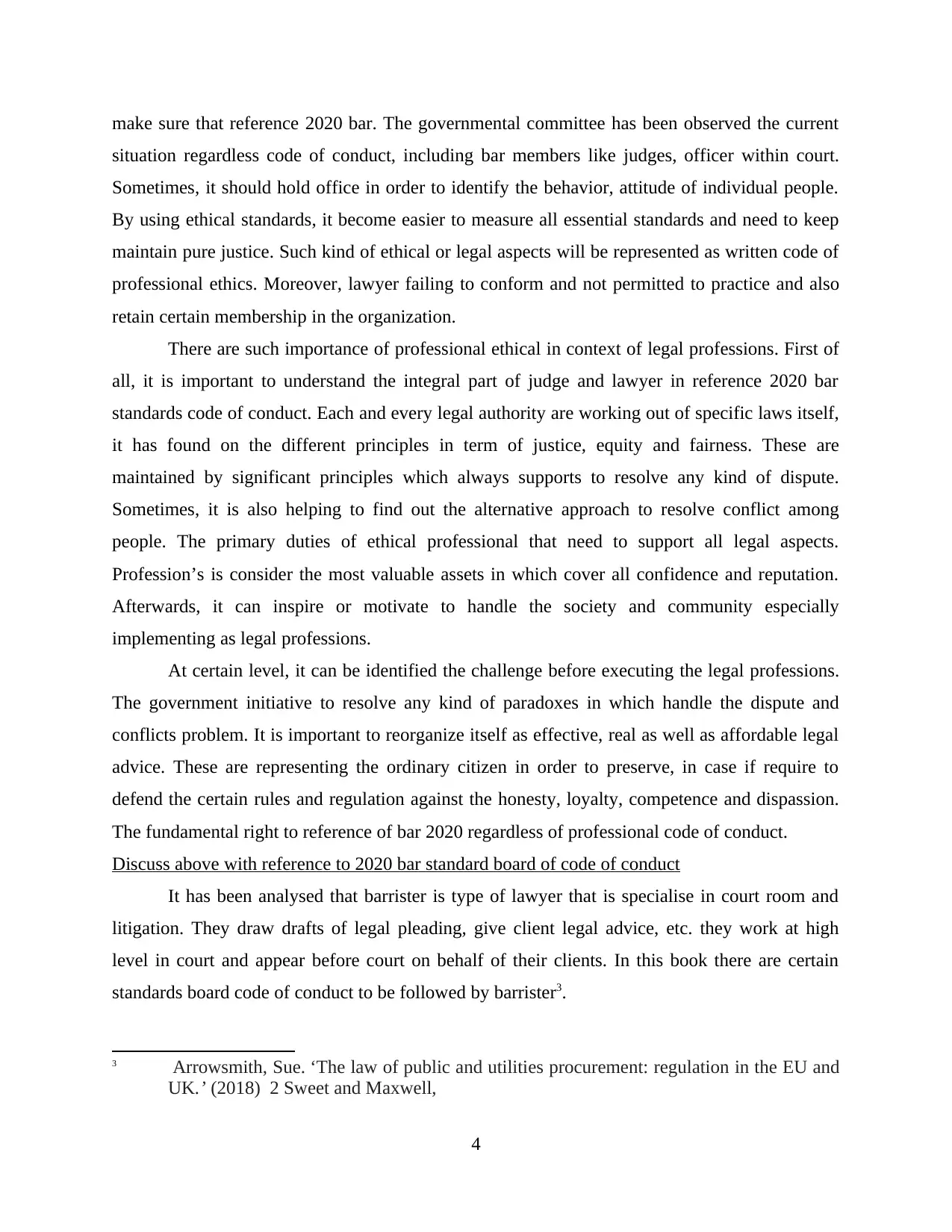
make sure that reference 2020 bar. The governmental committee has been observed the current
situation regardless code of conduct, including bar members like judges, officer within court.
Sometimes, it should hold office in order to identify the behavior, attitude of individual people.
By using ethical standards, it become easier to measure all essential standards and need to keep
maintain pure justice. Such kind of ethical or legal aspects will be represented as written code of
professional ethics. Moreover, lawyer failing to conform and not permitted to practice and also
retain certain membership in the organization.
There are such importance of professional ethical in context of legal professions. First of
all, it is important to understand the integral part of judge and lawyer in reference 2020 bar
standards code of conduct. Each and every legal authority are working out of specific laws itself,
it has found on the different principles in term of justice, equity and fairness. These are
maintained by significant principles which always supports to resolve any kind of dispute.
Sometimes, it is also helping to find out the alternative approach to resolve conflict among
people. The primary duties of ethical professional that need to support all legal aspects.
Profession’s is consider the most valuable assets in which cover all confidence and reputation.
Afterwards, it can inspire or motivate to handle the society and community especially
implementing as legal professions.
At certain level, it can be identified the challenge before executing the legal professions.
The government initiative to resolve any kind of paradoxes in which handle the dispute and
conflicts problem. It is important to reorganize itself as effective, real as well as affordable legal
advice. These are representing the ordinary citizen in order to preserve, in case if require to
defend the certain rules and regulation against the honesty, loyalty, competence and dispassion.
The fundamental right to reference of bar 2020 regardless of professional code of conduct.
Discuss above with reference to 2020 bar standard board of code of conduct
It has been analysed that barrister is type of lawyer that is specialise in court room and
litigation. They draw drafts of legal pleading, give client legal advice, etc. they work at high
level in court and appear before court on behalf of their clients. In this book there are certain
standards board code of conduct to be followed by barrister3.
3 Arrowsmith, Sue. ‘The law of public and utilities procurement: regulation in the EU and
UK.’ (2018) 2 Sweet and Maxwell,
4
situation regardless code of conduct, including bar members like judges, officer within court.
Sometimes, it should hold office in order to identify the behavior, attitude of individual people.
By using ethical standards, it become easier to measure all essential standards and need to keep
maintain pure justice. Such kind of ethical or legal aspects will be represented as written code of
professional ethics. Moreover, lawyer failing to conform and not permitted to practice and also
retain certain membership in the organization.
There are such importance of professional ethical in context of legal professions. First of
all, it is important to understand the integral part of judge and lawyer in reference 2020 bar
standards code of conduct. Each and every legal authority are working out of specific laws itself,
it has found on the different principles in term of justice, equity and fairness. These are
maintained by significant principles which always supports to resolve any kind of dispute.
Sometimes, it is also helping to find out the alternative approach to resolve conflict among
people. The primary duties of ethical professional that need to support all legal aspects.
Profession’s is consider the most valuable assets in which cover all confidence and reputation.
Afterwards, it can inspire or motivate to handle the society and community especially
implementing as legal professions.
At certain level, it can be identified the challenge before executing the legal professions.
The government initiative to resolve any kind of paradoxes in which handle the dispute and
conflicts problem. It is important to reorganize itself as effective, real as well as affordable legal
advice. These are representing the ordinary citizen in order to preserve, in case if require to
defend the certain rules and regulation against the honesty, loyalty, competence and dispassion.
The fundamental right to reference of bar 2020 regardless of professional code of conduct.
Discuss above with reference to 2020 bar standard board of code of conduct
It has been analysed that barrister is type of lawyer that is specialise in court room and
litigation. They draw drafts of legal pleading, give client legal advice, etc. they work at high
level in court and appear before court on behalf of their clients. In this book there are certain
standards board code of conduct to be followed by barrister3.
3 Arrowsmith, Sue. ‘The law of public and utilities procurement: regulation in the EU and
UK.’ (2018) 2 Sweet and Maxwell,
4
Paraphrase This Document
Need a fresh take? Get an instant paraphrase of this document with our AI Paraphraser
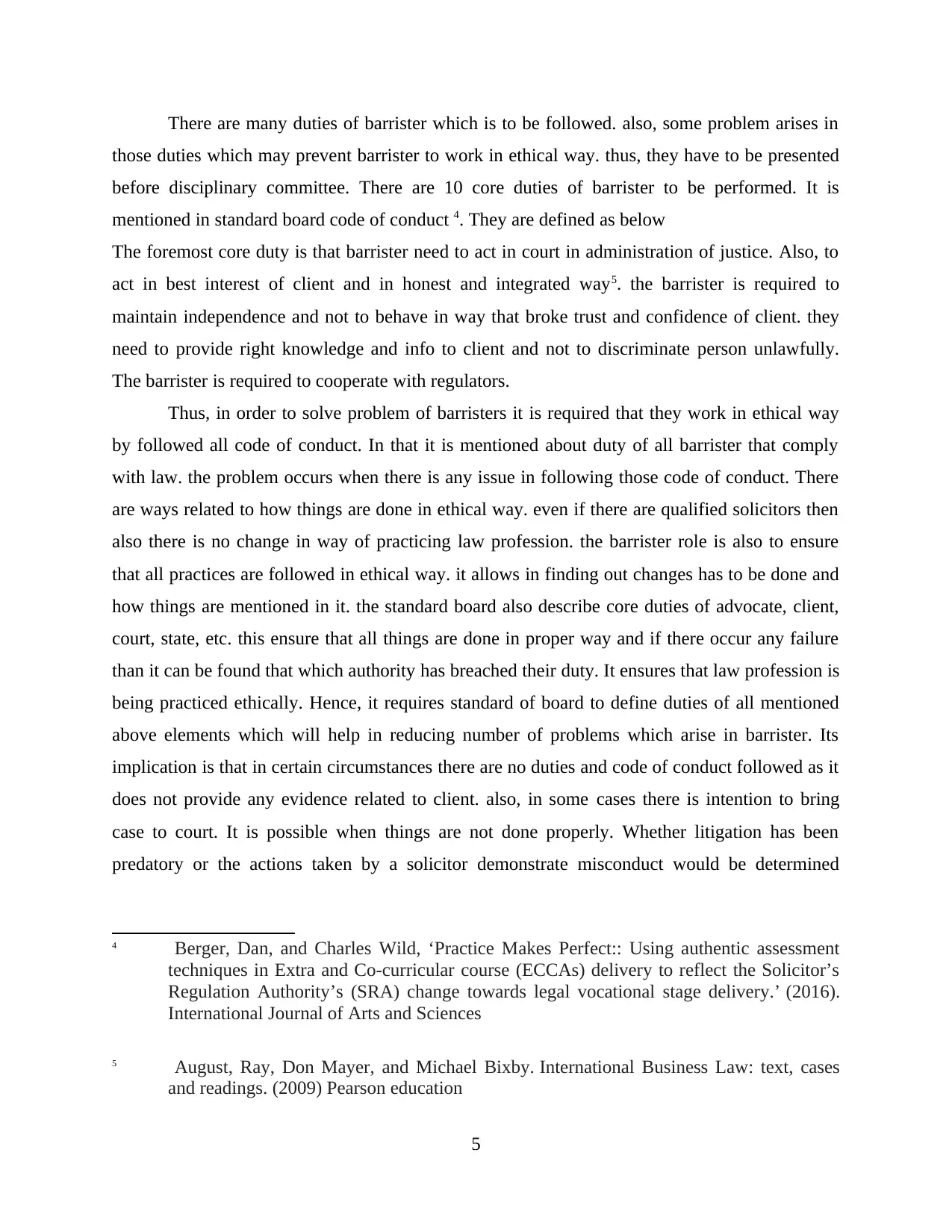
There are many duties of barrister which is to be followed. also, some problem arises in
those duties which may prevent barrister to work in ethical way. thus, they have to be presented
before disciplinary committee. There are 10 core duties of barrister to be performed. It is
mentioned in standard board code of conduct 4. They are defined as below
The foremost core duty is that barrister need to act in court in administration of justice. Also, to
act in best interest of client and in honest and integrated way5. the barrister is required to
maintain independence and not to behave in way that broke trust and confidence of client. they
need to provide right knowledge and info to client and not to discriminate person unlawfully.
The barrister is required to cooperate with regulators.
Thus, in order to solve problem of barristers it is required that they work in ethical way
by followed all code of conduct. In that it is mentioned about duty of all barrister that comply
with law. the problem occurs when there is any issue in following those code of conduct. There
are ways related to how things are done in ethical way. even if there are qualified solicitors then
also there is no change in way of practicing law profession. the barrister role is also to ensure
that all practices are followed in ethical way. it allows in finding out changes has to be done and
how things are mentioned in it. the standard board also describe core duties of advocate, client,
court, state, etc. this ensure that all things are done in proper way and if there occur any failure
than it can be found that which authority has breached their duty. It ensures that law profession is
being practiced ethically. Hence, it requires standard of board to define duties of all mentioned
above elements which will help in reducing number of problems which arise in barrister. Its
implication is that in certain circumstances there are no duties and code of conduct followed as it
does not provide any evidence related to client. also, in some cases there is intention to bring
case to court. It is possible when things are not done properly. Whether litigation has been
predatory or the actions taken by a solicitor demonstrate misconduct would be determined
4 Berger, Dan, and Charles Wild, ‘Practice Makes Perfect:: Using authentic assessment
techniques in Extra and Co-curricular course (ECCAs) delivery to reflect the Solicitor’s
Regulation Authority’s (SRA) change towards legal vocational stage delivery.’ (2016).
International Journal of Arts and Sciences
5 August, Ray, Don Mayer, and Michael Bixby. International Business Law: text, cases
and readings. (2009) Pearson education
5
those duties which may prevent barrister to work in ethical way. thus, they have to be presented
before disciplinary committee. There are 10 core duties of barrister to be performed. It is
mentioned in standard board code of conduct 4. They are defined as below
The foremost core duty is that barrister need to act in court in administration of justice. Also, to
act in best interest of client and in honest and integrated way5. the barrister is required to
maintain independence and not to behave in way that broke trust and confidence of client. they
need to provide right knowledge and info to client and not to discriminate person unlawfully.
The barrister is required to cooperate with regulators.
Thus, in order to solve problem of barristers it is required that they work in ethical way
by followed all code of conduct. In that it is mentioned about duty of all barrister that comply
with law. the problem occurs when there is any issue in following those code of conduct. There
are ways related to how things are done in ethical way. even if there are qualified solicitors then
also there is no change in way of practicing law profession. the barrister role is also to ensure
that all practices are followed in ethical way. it allows in finding out changes has to be done and
how things are mentioned in it. the standard board also describe core duties of advocate, client,
court, state, etc. this ensure that all things are done in proper way and if there occur any failure
than it can be found that which authority has breached their duty. It ensures that law profession is
being practiced ethically. Hence, it requires standard of board to define duties of all mentioned
above elements which will help in reducing number of problems which arise in barrister. Its
implication is that in certain circumstances there are no duties and code of conduct followed as it
does not provide any evidence related to client. also, in some cases there is intention to bring
case to court. It is possible when things are not done properly. Whether litigation has been
predatory or the actions taken by a solicitor demonstrate misconduct would be determined
4 Berger, Dan, and Charles Wild, ‘Practice Makes Perfect:: Using authentic assessment
techniques in Extra and Co-curricular course (ECCAs) delivery to reflect the Solicitor’s
Regulation Authority’s (SRA) change towards legal vocational stage delivery.’ (2016).
International Journal of Arts and Sciences
5 August, Ray, Don Mayer, and Michael Bixby. International Business Law: text, cases
and readings. (2009) Pearson education
5
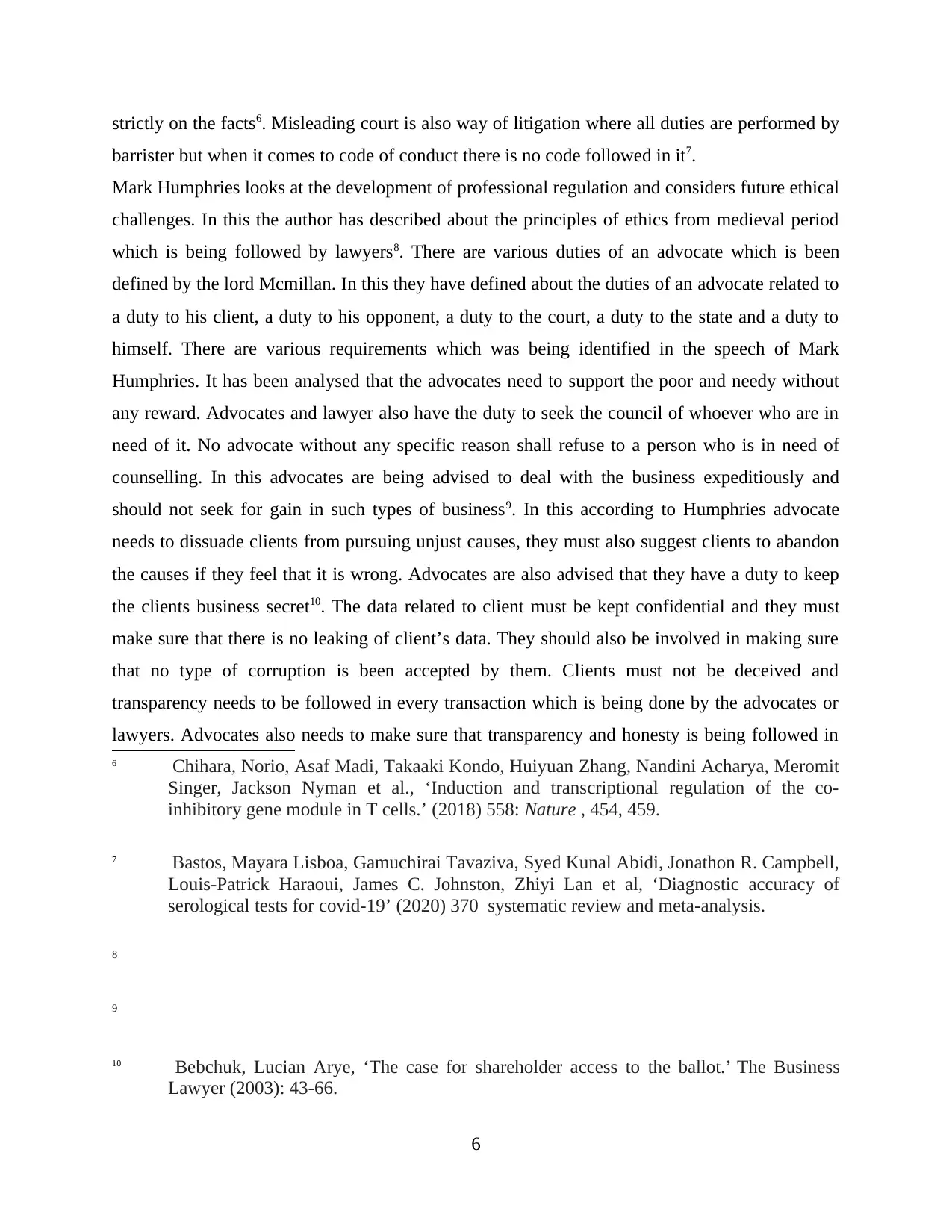
strictly on the facts6. Misleading court is also way of litigation where all duties are performed by
barrister but when it comes to code of conduct there is no code followed in it7.
Mark Humphries looks at the development of professional regulation and considers future ethical
challenges. In this the author has described about the principles of ethics from medieval period
which is being followed by lawyers8. There are various duties of an advocate which is been
defined by the lord Mcmillan. In this they have defined about the duties of an advocate related to
a duty to his client, a duty to his opponent, a duty to the court, a duty to the state and a duty to
himself. There are various requirements which was being identified in the speech of Mark
Humphries. It has been analysed that the advocates need to support the poor and needy without
any reward. Advocates and lawyer also have the duty to seek the council of whoever who are in
need of it. No advocate without any specific reason shall refuse to a person who is in need of
counselling. In this advocates are being advised to deal with the business expeditiously and
should not seek for gain in such types of business9. In this according to Humphries advocate
needs to dissuade clients from pursuing unjust causes, they must also suggest clients to abandon
the causes if they feel that it is wrong. Advocates are also advised that they have a duty to keep
the clients business secret10. The data related to client must be kept confidential and they must
make sure that there is no leaking of client’s data. They should also be involved in making sure
that no type of corruption is been accepted by them. Clients must not be deceived and
transparency needs to be followed in every transaction which is being done by the advocates or
lawyers. Advocates also needs to make sure that transparency and honesty is being followed in
6 Chihara, Norio, Asaf Madi, Takaaki Kondo, Huiyuan Zhang, Nandini Acharya, Meromit
Singer, Jackson Nyman et al., ‘Induction and transcriptional regulation of the co-
inhibitory gene module in T cells.’ (2018) 558: Nature , 454, 459.
7 Bastos, Mayara Lisboa, Gamuchirai Tavaziva, Syed Kunal Abidi, Jonathon R. Campbell,
Louis-Patrick Haraoui, James C. Johnston, Zhiyi Lan et al, ‘Diagnostic accuracy of
serological tests for covid-19’ (2020) 370 systematic review and meta-analysis.
8
9
10 Bebchuk, Lucian Arye, ‘The case for shareholder access to the ballot.’ The Business
Lawyer (2003): 43-66.
6
barrister but when it comes to code of conduct there is no code followed in it7.
Mark Humphries looks at the development of professional regulation and considers future ethical
challenges. In this the author has described about the principles of ethics from medieval period
which is being followed by lawyers8. There are various duties of an advocate which is been
defined by the lord Mcmillan. In this they have defined about the duties of an advocate related to
a duty to his client, a duty to his opponent, a duty to the court, a duty to the state and a duty to
himself. There are various requirements which was being identified in the speech of Mark
Humphries. It has been analysed that the advocates need to support the poor and needy without
any reward. Advocates and lawyer also have the duty to seek the council of whoever who are in
need of it. No advocate without any specific reason shall refuse to a person who is in need of
counselling. In this advocates are being advised to deal with the business expeditiously and
should not seek for gain in such types of business9. In this according to Humphries advocate
needs to dissuade clients from pursuing unjust causes, they must also suggest clients to abandon
the causes if they feel that it is wrong. Advocates are also advised that they have a duty to keep
the clients business secret10. The data related to client must be kept confidential and they must
make sure that there is no leaking of client’s data. They should also be involved in making sure
that no type of corruption is been accepted by them. Clients must not be deceived and
transparency needs to be followed in every transaction which is being done by the advocates or
lawyers. Advocates also needs to make sure that transparency and honesty is being followed in
6 Chihara, Norio, Asaf Madi, Takaaki Kondo, Huiyuan Zhang, Nandini Acharya, Meromit
Singer, Jackson Nyman et al., ‘Induction and transcriptional regulation of the co-
inhibitory gene module in T cells.’ (2018) 558: Nature , 454, 459.
7 Bastos, Mayara Lisboa, Gamuchirai Tavaziva, Syed Kunal Abidi, Jonathon R. Campbell,
Louis-Patrick Haraoui, James C. Johnston, Zhiyi Lan et al, ‘Diagnostic accuracy of
serological tests for covid-19’ (2020) 370 systematic review and meta-analysis.
8
9
10 Bebchuk, Lucian Arye, ‘The case for shareholder access to the ballot.’ The Business
Lawyer (2003): 43-66.
6
⊘ This is a preview!⊘
Do you want full access?
Subscribe today to unlock all pages.

Trusted by 1+ million students worldwide
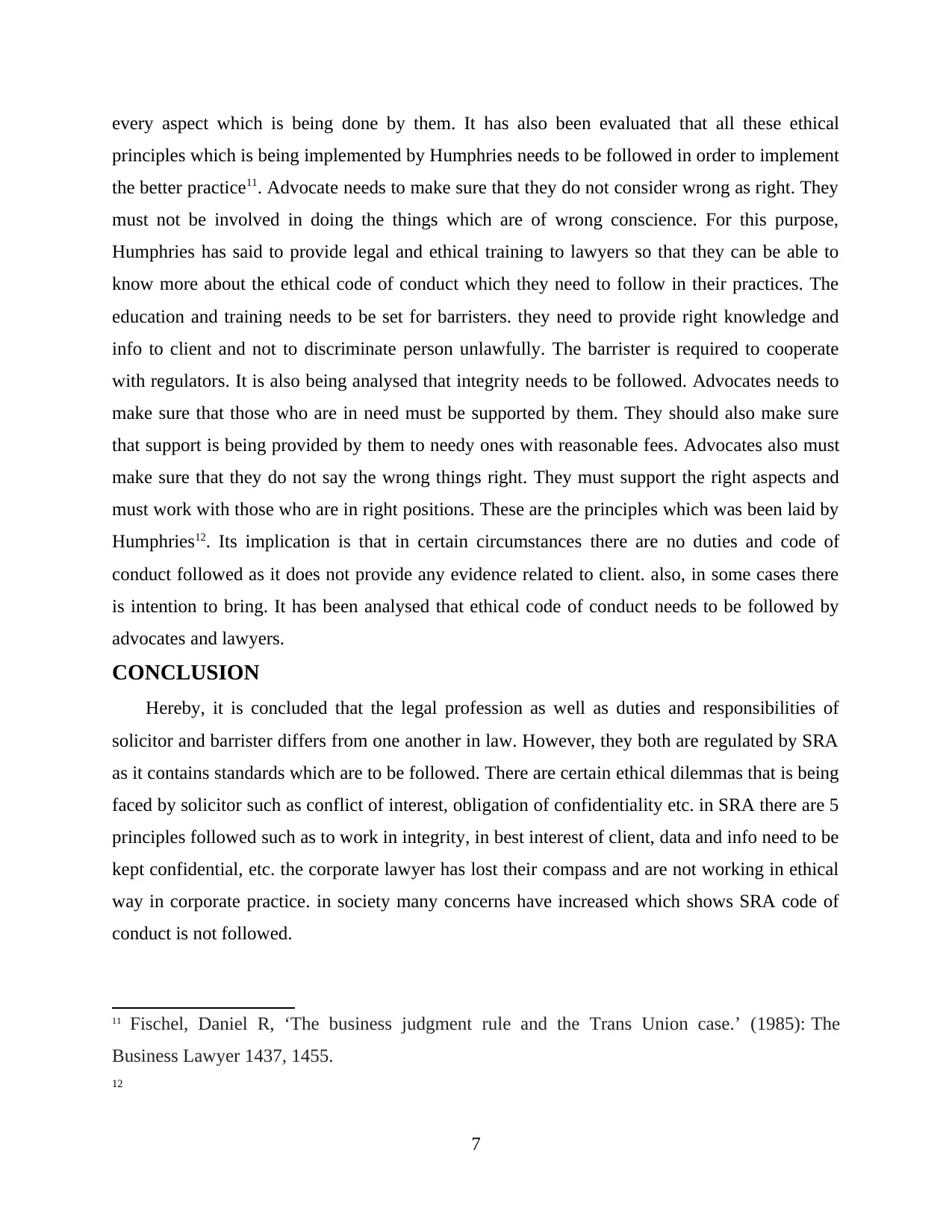
every aspect which is being done by them. It has also been evaluated that all these ethical
principles which is being implemented by Humphries needs to be followed in order to implement
the better practice11. Advocate needs to make sure that they do not consider wrong as right. They
must not be involved in doing the things which are of wrong conscience. For this purpose,
Humphries has said to provide legal and ethical training to lawyers so that they can be able to
know more about the ethical code of conduct which they need to follow in their practices. The
education and training needs to be set for barristers. they need to provide right knowledge and
info to client and not to discriminate person unlawfully. The barrister is required to cooperate
with regulators. It is also being analysed that integrity needs to be followed. Advocates needs to
make sure that those who are in need must be supported by them. They should also make sure
that support is being provided by them to needy ones with reasonable fees. Advocates also must
make sure that they do not say the wrong things right. They must support the right aspects and
must work with those who are in right positions. These are the principles which was been laid by
Humphries12. Its implication is that in certain circumstances there are no duties and code of
conduct followed as it does not provide any evidence related to client. also, in some cases there
is intention to bring. It has been analysed that ethical code of conduct needs to be followed by
advocates and lawyers.
CONCLUSION
Hereby, it is concluded that the legal profession as well as duties and responsibilities of
solicitor and barrister differs from one another in law. However, they both are regulated by SRA
as it contains standards which are to be followed. There are certain ethical dilemmas that is being
faced by solicitor such as conflict of interest, obligation of confidentiality etc. in SRA there are 5
principles followed such as to work in integrity, in best interest of client, data and info need to be
kept confidential, etc. the corporate lawyer has lost their compass and are not working in ethical
way in corporate practice. in society many concerns have increased which shows SRA code of
conduct is not followed.
11 Fischel, Daniel R, ‘The business judgment rule and the Trans Union case.’ (1985): The
Business Lawyer 1437, 1455.
12
7
principles which is being implemented by Humphries needs to be followed in order to implement
the better practice11. Advocate needs to make sure that they do not consider wrong as right. They
must not be involved in doing the things which are of wrong conscience. For this purpose,
Humphries has said to provide legal and ethical training to lawyers so that they can be able to
know more about the ethical code of conduct which they need to follow in their practices. The
education and training needs to be set for barristers. they need to provide right knowledge and
info to client and not to discriminate person unlawfully. The barrister is required to cooperate
with regulators. It is also being analysed that integrity needs to be followed. Advocates needs to
make sure that those who are in need must be supported by them. They should also make sure
that support is being provided by them to needy ones with reasonable fees. Advocates also must
make sure that they do not say the wrong things right. They must support the right aspects and
must work with those who are in right positions. These are the principles which was been laid by
Humphries12. Its implication is that in certain circumstances there are no duties and code of
conduct followed as it does not provide any evidence related to client. also, in some cases there
is intention to bring. It has been analysed that ethical code of conduct needs to be followed by
advocates and lawyers.
CONCLUSION
Hereby, it is concluded that the legal profession as well as duties and responsibilities of
solicitor and barrister differs from one another in law. However, they both are regulated by SRA
as it contains standards which are to be followed. There are certain ethical dilemmas that is being
faced by solicitor such as conflict of interest, obligation of confidentiality etc. in SRA there are 5
principles followed such as to work in integrity, in best interest of client, data and info need to be
kept confidential, etc. the corporate lawyer has lost their compass and are not working in ethical
way in corporate practice. in society many concerns have increased which shows SRA code of
conduct is not followed.
11 Fischel, Daniel R, ‘The business judgment rule and the Trans Union case.’ (1985): The
Business Lawyer 1437, 1455.
12
7
Paraphrase This Document
Need a fresh take? Get an instant paraphrase of this document with our AI Paraphraser

8
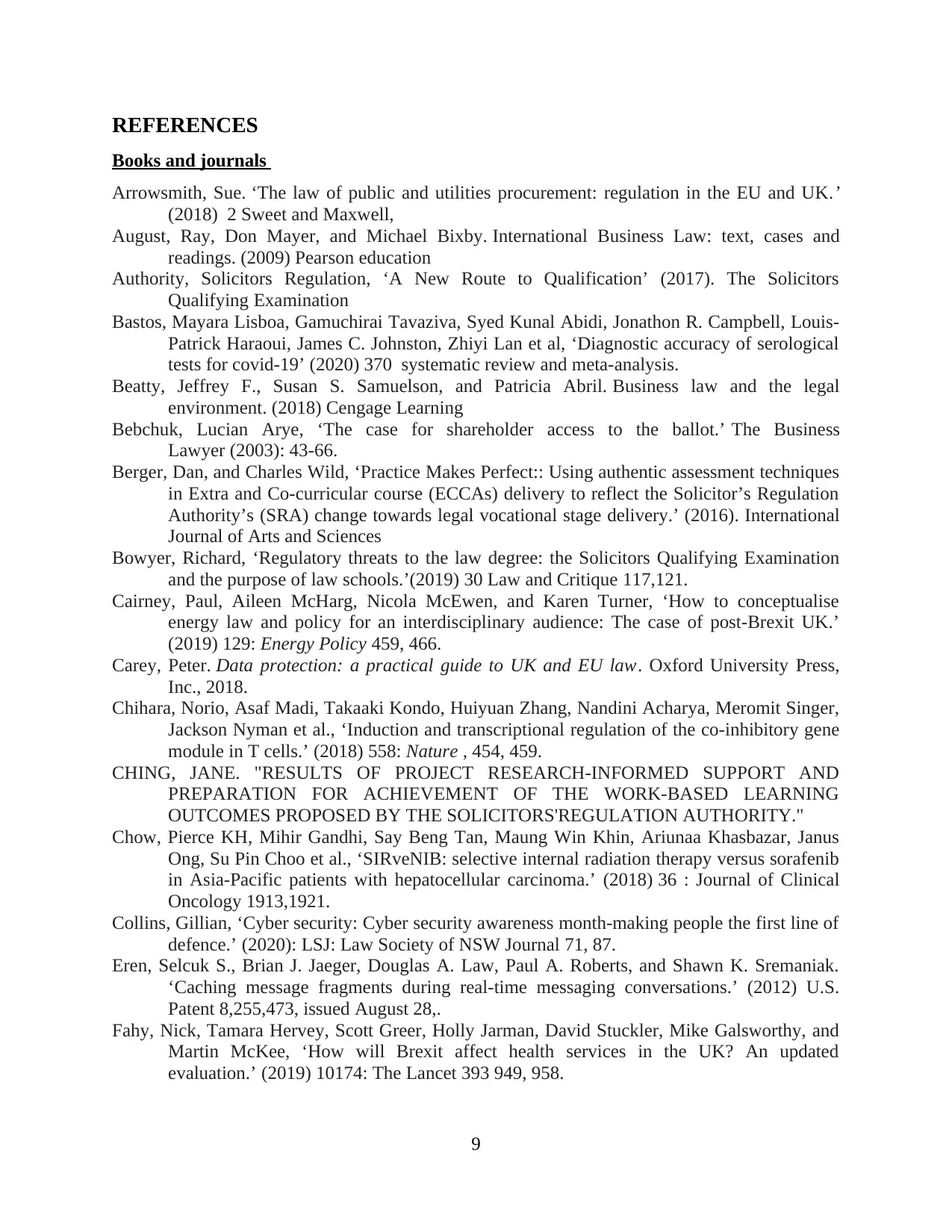
REFERENCES
Books and journals
Arrowsmith, Sue. ‘The law of public and utilities procurement: regulation in the EU and UK.’
(2018) 2 Sweet and Maxwell,
August, Ray, Don Mayer, and Michael Bixby. International Business Law: text, cases and
readings. (2009) Pearson education
Authority, Solicitors Regulation, ‘A New Route to Qualification’ (2017). The Solicitors
Qualifying Examination
Bastos, Mayara Lisboa, Gamuchirai Tavaziva, Syed Kunal Abidi, Jonathon R. Campbell, Louis-
Patrick Haraoui, James C. Johnston, Zhiyi Lan et al, ‘Diagnostic accuracy of serological
tests for covid-19’ (2020) 370 systematic review and meta-analysis.
Beatty, Jeffrey F., Susan S. Samuelson, and Patricia Abril. Business law and the legal
environment. (2018) Cengage Learning
Bebchuk, Lucian Arye, ‘The case for shareholder access to the ballot.’ The Business
Lawyer (2003): 43-66.
Berger, Dan, and Charles Wild, ‘Practice Makes Perfect:: Using authentic assessment techniques
in Extra and Co-curricular course (ECCAs) delivery to reflect the Solicitor’s Regulation
Authority’s (SRA) change towards legal vocational stage delivery.’ (2016). International
Journal of Arts and Sciences
Bowyer, Richard, ‘Regulatory threats to the law degree: the Solicitors Qualifying Examination
and the purpose of law schools.’(2019) 30 Law and Critique 117,121.
Cairney, Paul, Aileen McHarg, Nicola McEwen, and Karen Turner, ‘How to conceptualise
energy law and policy for an interdisciplinary audience: The case of post-Brexit UK.’
(2019) 129: Energy Policy 459, 466.
Carey, Peter. Data protection: a practical guide to UK and EU law. Oxford University Press,
Inc., 2018.
Chihara, Norio, Asaf Madi, Takaaki Kondo, Huiyuan Zhang, Nandini Acharya, Meromit Singer,
Jackson Nyman et al., ‘Induction and transcriptional regulation of the co-inhibitory gene
module in T cells.’ (2018) 558: Nature , 454, 459.
CHING, JANE. "RESULTS OF PROJECT RESEARCH-INFORMED SUPPORT AND
PREPARATION FOR ACHIEVEMENT OF THE WORK-BASED LEARNING
OUTCOMES PROPOSED BY THE SOLICITORS'REGULATION AUTHORITY."
Chow, Pierce KH, Mihir Gandhi, Say Beng Tan, Maung Win Khin, Ariunaa Khasbazar, Janus
Ong, Su Pin Choo et al., ‘SIRveNIB: selective internal radiation therapy versus sorafenib
in Asia-Pacific patients with hepatocellular carcinoma.’ (2018) 36 : Journal of Clinical
Oncology 1913,1921.
Collins, Gillian, ‘Cyber security: Cyber security awareness month-making people the first line of
defence.’ (2020): LSJ: Law Society of NSW Journal 71, 87.
Eren, Selcuk S., Brian J. Jaeger, Douglas A. Law, Paul A. Roberts, and Shawn K. Sremaniak.
‘Caching message fragments during real-time messaging conversations.’ (2012) U.S.
Patent 8,255,473, issued August 28,.
Fahy, Nick, Tamara Hervey, Scott Greer, Holly Jarman, David Stuckler, Mike Galsworthy, and
Martin McKee, ‘How will Brexit affect health services in the UK? An updated
evaluation.’ (2019) 10174: The Lancet 393 949, 958.
9
Books and journals
Arrowsmith, Sue. ‘The law of public and utilities procurement: regulation in the EU and UK.’
(2018) 2 Sweet and Maxwell,
August, Ray, Don Mayer, and Michael Bixby. International Business Law: text, cases and
readings. (2009) Pearson education
Authority, Solicitors Regulation, ‘A New Route to Qualification’ (2017). The Solicitors
Qualifying Examination
Bastos, Mayara Lisboa, Gamuchirai Tavaziva, Syed Kunal Abidi, Jonathon R. Campbell, Louis-
Patrick Haraoui, James C. Johnston, Zhiyi Lan et al, ‘Diagnostic accuracy of serological
tests for covid-19’ (2020) 370 systematic review and meta-analysis.
Beatty, Jeffrey F., Susan S. Samuelson, and Patricia Abril. Business law and the legal
environment. (2018) Cengage Learning
Bebchuk, Lucian Arye, ‘The case for shareholder access to the ballot.’ The Business
Lawyer (2003): 43-66.
Berger, Dan, and Charles Wild, ‘Practice Makes Perfect:: Using authentic assessment techniques
in Extra and Co-curricular course (ECCAs) delivery to reflect the Solicitor’s Regulation
Authority’s (SRA) change towards legal vocational stage delivery.’ (2016). International
Journal of Arts and Sciences
Bowyer, Richard, ‘Regulatory threats to the law degree: the Solicitors Qualifying Examination
and the purpose of law schools.’(2019) 30 Law and Critique 117,121.
Cairney, Paul, Aileen McHarg, Nicola McEwen, and Karen Turner, ‘How to conceptualise
energy law and policy for an interdisciplinary audience: The case of post-Brexit UK.’
(2019) 129: Energy Policy 459, 466.
Carey, Peter. Data protection: a practical guide to UK and EU law. Oxford University Press,
Inc., 2018.
Chihara, Norio, Asaf Madi, Takaaki Kondo, Huiyuan Zhang, Nandini Acharya, Meromit Singer,
Jackson Nyman et al., ‘Induction and transcriptional regulation of the co-inhibitory gene
module in T cells.’ (2018) 558: Nature , 454, 459.
CHING, JANE. "RESULTS OF PROJECT RESEARCH-INFORMED SUPPORT AND
PREPARATION FOR ACHIEVEMENT OF THE WORK-BASED LEARNING
OUTCOMES PROPOSED BY THE SOLICITORS'REGULATION AUTHORITY."
Chow, Pierce KH, Mihir Gandhi, Say Beng Tan, Maung Win Khin, Ariunaa Khasbazar, Janus
Ong, Su Pin Choo et al., ‘SIRveNIB: selective internal radiation therapy versus sorafenib
in Asia-Pacific patients with hepatocellular carcinoma.’ (2018) 36 : Journal of Clinical
Oncology 1913,1921.
Collins, Gillian, ‘Cyber security: Cyber security awareness month-making people the first line of
defence.’ (2020): LSJ: Law Society of NSW Journal 71, 87.
Eren, Selcuk S., Brian J. Jaeger, Douglas A. Law, Paul A. Roberts, and Shawn K. Sremaniak.
‘Caching message fragments during real-time messaging conversations.’ (2012) U.S.
Patent 8,255,473, issued August 28,.
Fahy, Nick, Tamara Hervey, Scott Greer, Holly Jarman, David Stuckler, Mike Galsworthy, and
Martin McKee, ‘How will Brexit affect health services in the UK? An updated
evaluation.’ (2019) 10174: The Lancet 393 949, 958.
9
⊘ This is a preview!⊘
Do you want full access?
Subscribe today to unlock all pages.

Trusted by 1+ million students worldwide
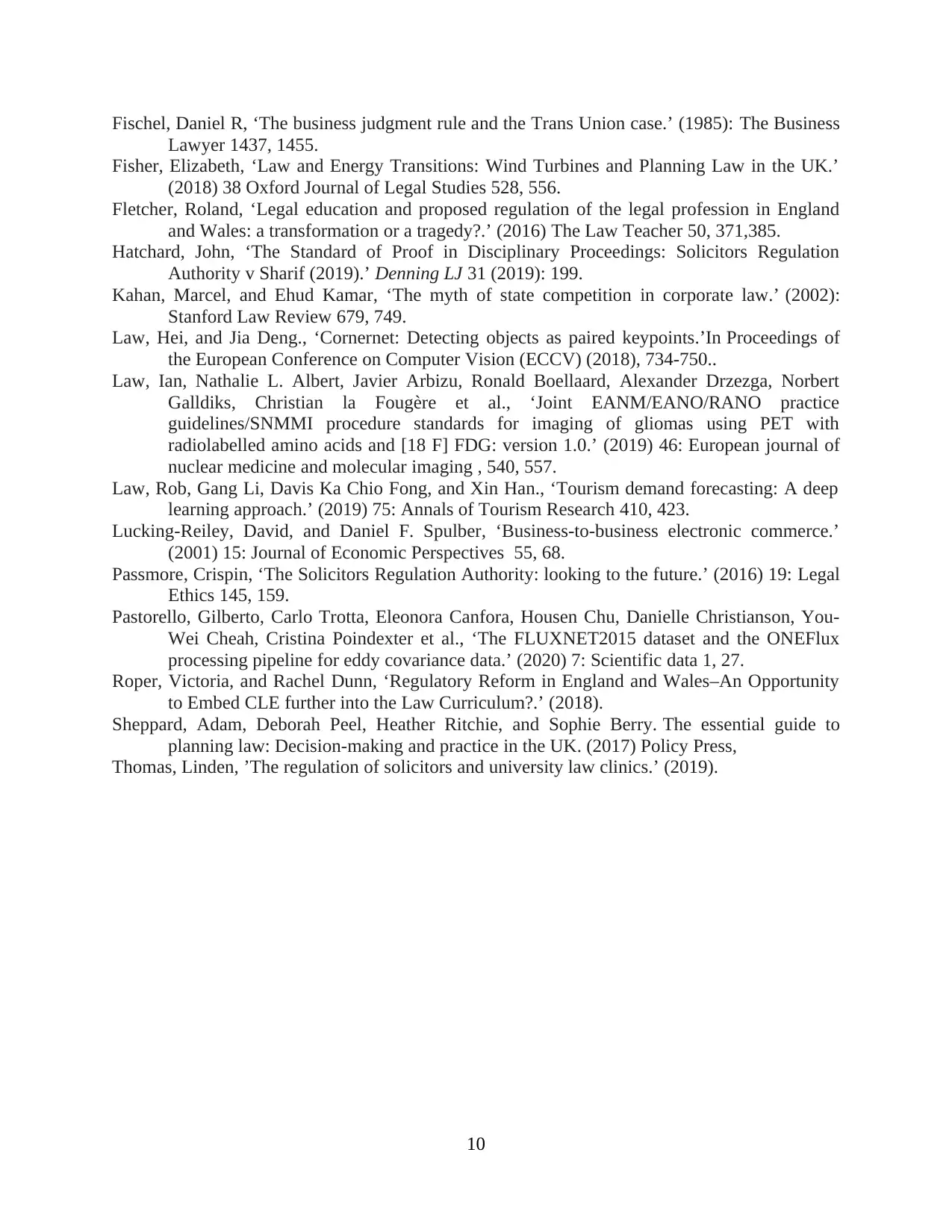
Fischel, Daniel R, ‘The business judgment rule and the Trans Union case.’ (1985): The Business
Lawyer 1437, 1455.
Fisher, Elizabeth, ‘Law and Energy Transitions: Wind Turbines and Planning Law in the UK.’
(2018) 38 Oxford Journal of Legal Studies 528, 556.
Fletcher, Roland, ‘Legal education and proposed regulation of the legal profession in England
and Wales: a transformation or a tragedy?.’ (2016) The Law Teacher 50, 371,385.
Hatchard, John, ‘The Standard of Proof in Disciplinary Proceedings: Solicitors Regulation
Authority v Sharif (2019).’ Denning LJ 31 (2019): 199.
Kahan, Marcel, and Ehud Kamar, ‘The myth of state competition in corporate law.’ (2002):
Stanford Law Review 679, 749.
Law, Hei, and Jia Deng., ‘Cornernet: Detecting objects as paired keypoints.’In Proceedings of
the European Conference on Computer Vision (ECCV) (2018), 734-750..
Law, Ian, Nathalie L. Albert, Javier Arbizu, Ronald Boellaard, Alexander Drzezga, Norbert
Galldiks, Christian la Fougère et al., ‘Joint EANM/EANO/RANO practice
guidelines/SNMMI procedure standards for imaging of gliomas using PET with
radiolabelled amino acids and [18 F] FDG: version 1.0.’ (2019) 46: European journal of
nuclear medicine and molecular imaging , 540, 557.
Law, Rob, Gang Li, Davis Ka Chio Fong, and Xin Han., ‘Tourism demand forecasting: A deep
learning approach.’ (2019) 75: Annals of Tourism Research 410, 423.
Lucking-Reiley, David, and Daniel F. Spulber, ‘Business-to-business electronic commerce.’
(2001) 15: Journal of Economic Perspectives 55, 68.
Passmore, Crispin, ‘The Solicitors Regulation Authority: looking to the future.’ (2016) 19: Legal
Ethics 145, 159.
Pastorello, Gilberto, Carlo Trotta, Eleonora Canfora, Housen Chu, Danielle Christianson, You-
Wei Cheah, Cristina Poindexter et al., ‘The FLUXNET2015 dataset and the ONEFlux
processing pipeline for eddy covariance data.’ (2020) 7: Scientific data 1, 27.
Roper, Victoria, and Rachel Dunn, ‘Regulatory Reform in England and Wales–An Opportunity
to Embed CLE further into the Law Curriculum?.’ (2018).
Sheppard, Adam, Deborah Peel, Heather Ritchie, and Sophie Berry. The essential guide to
planning law: Decision-making and practice in the UK. (2017) Policy Press,
Thomas, Linden, ’The regulation of solicitors and university law clinics.’ (2019).
10
Lawyer 1437, 1455.
Fisher, Elizabeth, ‘Law and Energy Transitions: Wind Turbines and Planning Law in the UK.’
(2018) 38 Oxford Journal of Legal Studies 528, 556.
Fletcher, Roland, ‘Legal education and proposed regulation of the legal profession in England
and Wales: a transformation or a tragedy?.’ (2016) The Law Teacher 50, 371,385.
Hatchard, John, ‘The Standard of Proof in Disciplinary Proceedings: Solicitors Regulation
Authority v Sharif (2019).’ Denning LJ 31 (2019): 199.
Kahan, Marcel, and Ehud Kamar, ‘The myth of state competition in corporate law.’ (2002):
Stanford Law Review 679, 749.
Law, Hei, and Jia Deng., ‘Cornernet: Detecting objects as paired keypoints.’In Proceedings of
the European Conference on Computer Vision (ECCV) (2018), 734-750..
Law, Ian, Nathalie L. Albert, Javier Arbizu, Ronald Boellaard, Alexander Drzezga, Norbert
Galldiks, Christian la Fougère et al., ‘Joint EANM/EANO/RANO practice
guidelines/SNMMI procedure standards for imaging of gliomas using PET with
radiolabelled amino acids and [18 F] FDG: version 1.0.’ (2019) 46: European journal of
nuclear medicine and molecular imaging , 540, 557.
Law, Rob, Gang Li, Davis Ka Chio Fong, and Xin Han., ‘Tourism demand forecasting: A deep
learning approach.’ (2019) 75: Annals of Tourism Research 410, 423.
Lucking-Reiley, David, and Daniel F. Spulber, ‘Business-to-business electronic commerce.’
(2001) 15: Journal of Economic Perspectives 55, 68.
Passmore, Crispin, ‘The Solicitors Regulation Authority: looking to the future.’ (2016) 19: Legal
Ethics 145, 159.
Pastorello, Gilberto, Carlo Trotta, Eleonora Canfora, Housen Chu, Danielle Christianson, You-
Wei Cheah, Cristina Poindexter et al., ‘The FLUXNET2015 dataset and the ONEFlux
processing pipeline for eddy covariance data.’ (2020) 7: Scientific data 1, 27.
Roper, Victoria, and Rachel Dunn, ‘Regulatory Reform in England and Wales–An Opportunity
to Embed CLE further into the Law Curriculum?.’ (2018).
Sheppard, Adam, Deborah Peel, Heather Ritchie, and Sophie Berry. The essential guide to
planning law: Decision-making and practice in the UK. (2017) Policy Press,
Thomas, Linden, ’The regulation of solicitors and university law clinics.’ (2019).
10
1 out of 10
Related Documents
Your All-in-One AI-Powered Toolkit for Academic Success.
+13062052269
info@desklib.com
Available 24*7 on WhatsApp / Email
![[object Object]](/_next/static/media/star-bottom.7253800d.svg)
Unlock your academic potential
Copyright © 2020–2026 A2Z Services. All Rights Reserved. Developed and managed by ZUCOL.





